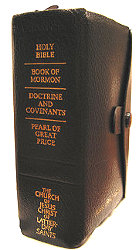Credit Where Credit Is Due, Part 1

When I was a teenager, the most visible fundamentalists in America were Carl McIntire and Lester Roloff. McIntire was feuding with the American Council of Christian Churches, the General Association of Regular Baptist Churches, several leaders within his own Bible Presbyterian Synod, and the federal government of the United States—virtually simultaneously. Lester Roloff was feuding with the state of Texas. I can remember him sending life-size cardboard cutout pictures of himself to our church in Iowa. He was trying hard to get enough public support to force the Texas regulators to back away from his ministry. The impression that I had of fundamentalist leaders was that they were hard-bitten, bellicose, and arrogant.
This impression had been reinforced through the years by the traveling preachers to whom I had been exposed. These men usually called themselves evangelists, but they were essentially hired guns whose job was to inflame the fears and the sense of shame of the faithful. They could be very personable, laughing and joking one moment, but then the next moment they would be screaming at you because the Communists were going to take over the United States before 1972 unless you went to the altar RIGHT NOW.
I would never have dreamed of criticizing any of these men. Were they not paragons of spiritual insight? Were they not models of Christian virtue? Who was I to call them into account?
Because of their influence, however, I was quite sure that I did not want to be a fundamentalist. Even after experiencing a call to vocational ministry and returning to a fundamentalist Bible college for training, I remained unpersuaded of the value of fundamentalism. During my early years as a college student, it seemed to me that the main activity of fundamentalism was to manufacture unreasonable ways of regulating personal conduct.
This was my frame of mind when I found myself in George Houghton’s summer module on the history of fundamentalism. I had signed up for the course only because nothing else was available to fill the hours. Within a week, Houghton completely reoriented my thinking.
Discussion
The second challenge to my MSTC brothers
While the distinction between the essential Word of God, the written Word of God, and the spoken Word of God have been lost in the present fog of Post-Christian Christian theology, I would like for my second challenge to my MSTC brothers to offer a glimpse into pre-Enlightenment theology in order to demonstrate your reckless abandonment of historical terminology, thought, and theology.
Discussion
Meaning of Rev. 3:20
Discussion
Is Mormonism a "Cult"?

A media “firestorm” (mostly a “manufactured” controversy, I have little doubt) arose recently when Robert Jeffress, pastor of historic First Baptist Church of Dallas, Texas, and a strong supporter of Texas Governor and presidential candidate Rick Perry, declared that Mormonism, the religion of rival candidate Mitt Romney, was a cult. Some in and out of the media expressed concern, disdain, even outrage at this insensitive, even, some said, bigoted remark. Regardless of the response to Pastor Jeffress’ words, the real question is—did he speak the truth? Is Mormonism in fact a non-Christian cult?
The first issue in settling such a question is the matter of definitions. What is a “cult”? I have seen various definitions, but have settled on my own, which is more of a characterization than strictly a definition.
What is a cult?
First, cults claim to be “real” or “restored” Christianity, which had somehow been “lost” somewhere between the first century and the time of the founding of the cult.
Second, cults are almost uniformly non-Trinitarian (most are Unitarian, but some are polytheistic).
Third, cults teach de facto or de jure the inadequacy and incompleteness of the revelation in Scripture, and hence the need for two things:
- a new inspired prophet or prophets (usually beginning with if not limited to the founder of the cult);
- further divine revelations, which are communicated through that prophet.
Fourth, cults, as with all false religions, teach salvation by means of human religious works.
Fifth, there is no salvation outside the cult.
Discussion
The Definition of a Cult, and Why It Matters

Two stories have been lighting up the evangelical world over the past couple of weeks. Surprisingly, no one has bothered to connect the two. That is too bad, because they actually have a great deal to do with each other.
In the first story, Robert Jeffress, pastor of First Baptist Church in Dallas, has touched off quite a controversy with a remark about presidential candidate Mitt Romney. According to published reports, Pastor Jeffress commented that Romney is “a good moral person,” but added that Mormonism has “always been considered a cult by the mainstream of Christianity.” Texas Governor Rick Perry quickly distanced himself from the remark, as did other Republican presidential hopefuls.
Pastor Jeffress’s remark, however, is not going to be ignored. The church that he pastors was at the center of the conservative resurgence in the Southern Baptist Convention. It is one of the most influential congregations in the United States. His pastorate gives him a platform from which to make his voice heard—and this time, at least, he has been heard loudly, if not clearly.
One of his critics is Dr. Richard Mouw, president of Fuller Theological Seminary. SO strenuously did President Mouw object to Pastor Jeffress’s remarks that he authored a response published by CNN. Entitled, “My Take: This Evangelical Says Mormonism Isn’t a Cult,” President Mouw leaves little doubt about his thesis.
Discussion
Biblical Theology of Work
John
Discussion
A John 3:16 Discount
Body
Discussion
Answering the 95 Theses Against Dispensationalism, Part 18
 Republished with permission from Dr. Reluctant. In this series, Dr. Henebury responds to a collection of criticisms of dispensationalism entitled “95 Theses against Dispensationalism” written by a group called “The Nicene Council.” Read the series so far.
Republished with permission from Dr. Reluctant. In this series, Dr. Henebury responds to a collection of criticisms of dispensationalism entitled “95 Theses against Dispensationalism” written by a group called “The Nicene Council.” Read the series so far.
Thesis 80
Contrary to dispensationalism’s teaching that a physical temple will be rebuilt, the New Testament speaks of the building of the temple as the building of the Church in Christ, so that “the whole building, being fitted together is growing into a holy temple in the Lord” (Eph 2:21); the only temple seen in the book of Revelation is in Heaven, which is the real and eternal temple of which the earthly temporary temple was, according to the book of Hebrews, only a “shadow” or “copy” (Heb 8:5; 9:24).
Response: Note that this objection is a deduction from these passages, not a plain declaration of the texts themselves. Do these passages deny “that a physical temple will be rebuilt”? No they do not. But let’s take a look at some that do teach that a literal temple will be rebuilt in the future (italics added):
Matthew 24:15: Therefore when you see the abomination of desolation spoken of by Daniel the prophet, standing in the holy place.
The geographical context is “Judea” (the next verse), and the eschatological context is “the end” (Matt.24:3, 6, 14, 21, 27, 29-30). The Nicene Council notwithstanding, these verses are not referring to AD 70! They are speaking about a time of “tribulation” (Matt.24:21, 29) occurring right before the Second Coming of Christ (Matt.24:29-31). The “holy place” of verse 15, then, is standing in Judea just prior to Christ’s return!
Discussion
Book Review - Waiting for the Land: The Story Line of the Pentateuch
[amazon 0875521967 thumbnail]
Over the past few years I have fallen in love with the Pentateuch. I now see it as some of the richest theology in all of Scripture. So when I saw this book from P & R Publishing, its title and evocative cover had me hooked in no time flat. Waiting for the Land: The Story Line of the Pentateuch by Arie C. Leder did not disappoint. Instead old insights were crystallized and new gems were discovered as I paged through this wonderful book.
Discussion